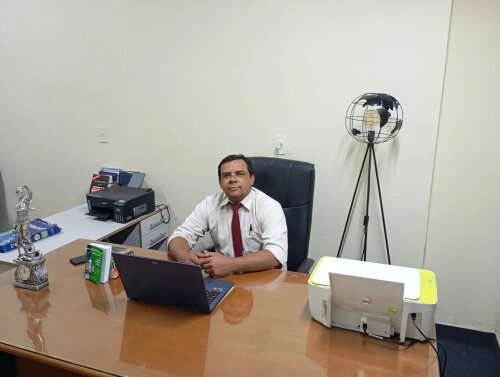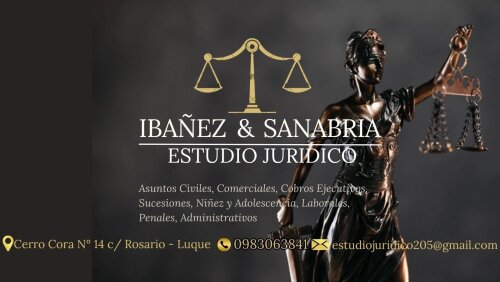Best Lawyers in Luque
Share your needs with us, get contacted by law firms.
Free. Takes 2 min.
List of the best lawyers in Luque, Paraguay
About hiring a lawyer in Luque, Paraguay
Hiring a lawyer in Luque follows a straightforward process similar to other Paraguayan cities. Most people begin by identifying lawyers or law firms that handle the type of matter they face - for example, family law, property and real estate, labor disputes, criminal defense, or business matters. After identifying candidates, the usual steps are to request an initial consultation, share the basic facts and documents of the case, agree the scope of services and fees in writing, and sign a professional engagement or representation agreement. Lawyers in Paraguay must be registered with the relevant bar association or colegio de abogados and must comply with professional ethics and court rules. The primary working language for most lawyers and courts is Spanish, and local procedures and documents will normally be in Spanish or Guarani.
Why You May Need a Lawyer
There are many situations in Luque where professional legal advice or representation is important. Common reasons include criminal charges or police investigations where a lawyer can protect rights from the outset. Family matters such as divorce, child custody, and inheritance proceedings often require legal assistance to ensure correct filings, enforce agreements, and protect interests. Property transactions and real estate registrations require legal review, proper notarization, and registration to avoid future disputes. Labor disputes and termination questions require knowledge of Paraguayan labor law and administrative steps. Business owners need advice on company formation, contracts, tax compliance, and commercial litigation. Finally, immigration questions, consumer complaints, and administrative appeals before municipal authorities or national agencies are other frequent reasons to seek counsel.
Local Laws Overview
Paraguay follows a civil law tradition. Key legal sources include codes and statutes such as the Civil Code, the Commercial Code, the Penal Code, labor legislation, and tax and administrative rules. Courts operate at local and national levels, with trial courts or juzgados de primera instancia handling many civil and criminal cases, and appeals moving up to higher courts and ultimately to the Corte Suprema de Justicia. The Ministerio Pblico and Fiscalía General handle criminal investigation and prosecution, while the Defensoría Pública may provide legal defense for those who qualify. Notaries and public registries play a central role in real estate and formal contract law - many property transfers and important contracts must be executed as escritura pública before a notary public and then recorded in the public registries to be fully effective. Municipal ordinances and regulations from the Municipalidad de Luque also affect business permits, construction, zoning and local tax obligations. Time limits - prescripción and caducidad - are strict in many areas, so early advice is often critical. Language and procedure are local - official filings and court hearings are normally in Spanish, and judges expect procedures to follow Paraguayan civil procedure and evidence rules.
Frequently Asked Questions
How do I find a qualified lawyer in Luque?
Start by asking for referrals from people you trust, local businesses, or professional associations. Look for lawyers with experience in the specific area of law you need. Confirm that the lawyer is registered with a regional or national bar association and ask about recent cases or outcomes in similar matters. An initial consultation will let you assess their communication style, approach and suitability for your case.
How much will a lawyer cost in Luque?
Costs vary widely based on experience, complexity of the matter, and billing method. Lawyers may charge a fixed fee for discrete services, an hourly rate, or a contingency fee in some civil matters. There are often additional costs for court fees, expert reports, notary fees, translators, and registry charges. Ask for a written fee estimate or engagement letter that outlines likely costs and billing terms.
What is a retainer and do I need one?
A retainer is an upfront payment to secure a lawyer s services and to be drawn against as work is performed. Not every matter requires a retainer, but it is common for ongoing representation or cases that will involve court work. The retainer should be documented and the lawyer should provide periodic accounting of fees and expenses applied against it.
Can I hire a lawyer who does not speak Spanish?
Most legal work and court proceedings are in Spanish, so it is essential that either you or your lawyer can communicate effectively in Spanish. If you hire a lawyer who speaks another language, plan on using a certified translator or interpreter for formal documents and hearings. For foreign clients, some lawyers in Luque offer bilingual services or can work with translators to manage communication.
How can I check a lawyer s credentials and disciplinary record?
Ask the lawyer for their registration number and the name of the colegio de abogados with which they are registered. You may contact the local bar association or the national bar body to confirm registration and check for any disciplinary history. Official judicial or bar association offices may also provide guidance on ethical complaints and professional standing.
What documents should I bring to my first meeting?
Bring any documents that are relevant to the issue - contracts, court notices, police reports, identification, property titles, invoices, employment records, and correspondence. A clear timeline of events and a list of questions or objectives will help your lawyer evaluate the case more efficiently and provide accurate initial advice.
How long will my case take to resolve?
Timelines depend on the type of matter, court congestion, whether the case is litigated or settled, and whether appeals are likely. Some administrative matters and negotiated settlements can be resolved in weeks or months. Litigation - civil or criminal - may take many months to years if appeals follow. Your lawyer can provide a realistic timeline after reviewing the facts and applicable procedures.
What if I cannot afford a private lawyer?
If you cannot afford a private attorney, you may be eligible for assistance from the Defensoría Pública or other public legal aid programs. For criminal matters, the state provides defense for those who qualify. For civil matters, there are non-governmental organizations and legal aid clinics that assist low-income people with certain types of cases. Explain your financial situation when you contact public bodies or NGOs to determine eligibility.
Do I need a lawyer to buy or sell property in Luque?
While not always legally mandatory, using a lawyer for property transactions is strongly recommended. Real estate transfers require correct documentation, notarization as escritura pública, and registration with the appropriate public registry. A lawyer will perform title checks, ensure all taxes and liens are addressed, draft transactional documents, and supervise registration to reduce the risk of later disputes.
What should I do if the police detain a relative or friend?
If someone is detained, remain calm and seek immediate legal help. Request to contact a lawyer and insist on the right to legal counsel during police interviews. If the person detained cannot afford counsel, ask about public defense services. Take note of the arresting agency, location of detention, and any charges. Do not sign statements without a lawyer present and communicate clearly but respectfully with authorities until counsel arrives.
Additional Resources
When you need reliable information or official assistance, these governmental bodies and institutions are useful starting points. The Poder Judicial and Corte Suprema de Justicia oversee court administration and published procedural rules. The Ministerio Pblico or Fiscalía General del Estado handles criminal prosecutions and related inquiries. The Ministerio de Justicia provides information on legal aid programs, notary regulations and public registries. The Municipalidad de Luque administers local permits, municipal ordinances and consumer matters at the city level. The Defensoría Pública provides legal defense to qualified individuals in criminal matters and may offer guidance on access to justice. For matters involving registration of property and commercial entities, seek advice on the public registries and the relevant registry office that maintains land and commerce records. If you are a foreign national, your embassy or consulate can provide consular assistance and a list of local lawyers who speak your language.
Next Steps
Begin by clarifying the issue and gathering all relevant documents and dates. Prepare a concise summary of events and a list of questions you want to ask a lawyer. Contact one or more lawyers or law firms that have experience in the area you need, request an initial consultation, and confirm language capabilities and fees in advance. During the consultation, ask about the lawyer s proposed strategy, estimated timeline, likely costs, and how they will communicate progress. Request a written engagement letter that defines the scope of work, fees and billing practices. If you cannot afford a private lawyer, contact the Defensoría Pública or other legal aid providers to determine eligibility. Keep organized records of all documents, communications and receipts, and follow your lawyer s instructions for filing deadlines and evidence preservation. Acting early and choosing counsel with relevant experience will help protect your rights and improve the chances of a favorable outcome.
Lawzana helps you find the best lawyers and law firms in Luque through a curated and pre-screened list of qualified legal professionals. Our platform offers rankings and detailed profiles of attorneys and law firms, allowing you to compare based on practice areas, experience, and client feedback.
Each profile includes a description of the firm's areas of practice, client reviews, team members and partners, year of establishment, spoken languages, office locations, contact information, social media presence, and any published articles or resources. Most firms on our platform speak English and are experienced in both local and international legal matters.
Get a quote from top-rated law firms in Luque, Paraguay — quickly, securely, and without unnecessary hassle.
Disclaimer:
The information provided on this page is for general informational purposes only and does not constitute legal advice. While we strive to ensure the accuracy and relevance of the content, legal information may change over time, and interpretations of the law can vary. You should always consult with a qualified legal professional for advice specific to your situation.
We disclaim all liability for actions taken or not taken based on the content of this page. If you believe any information is incorrect or outdated, please contact us, and we will review and update it where appropriate.
Refine your search by selecting a practice area.




























